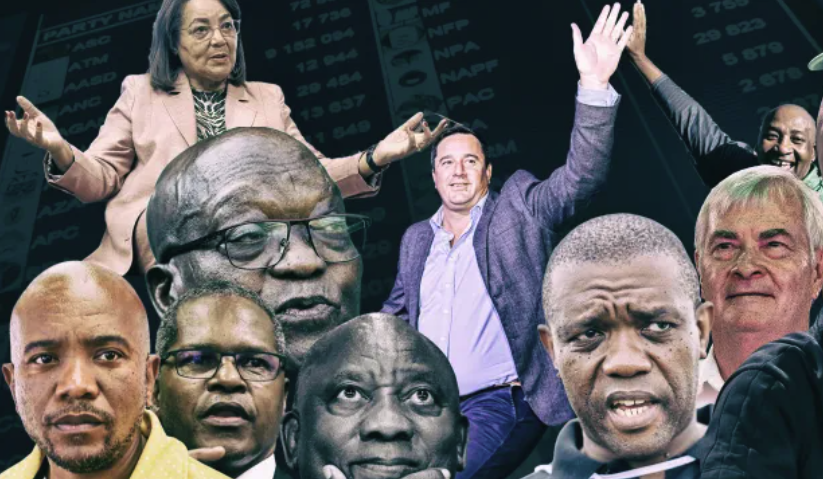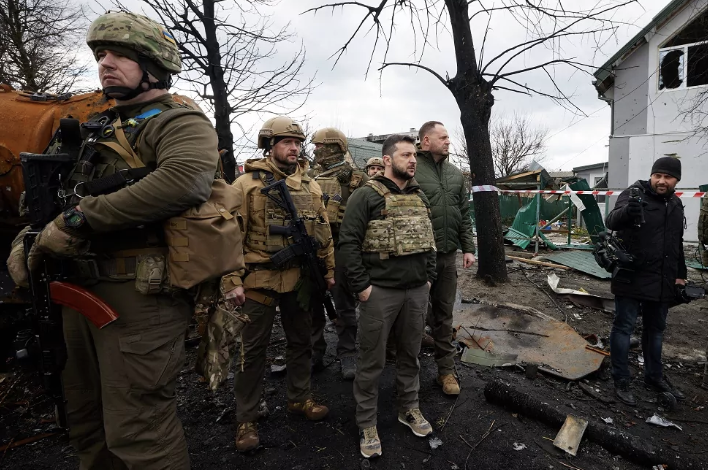News
Assessing the GNU – it’s One Thing to Dodge a Bullet, it’s Another to Win a War
The change in the national mood and the popping of the populist balloon should not be mistaken for real change in the fortunes of South Africans. The real exam question is: How, if at all, have the fortunes of South Africans changed for the better?

Research Director, The Brenthurst Foundation

Director, The Brenthurst Foundation

South Africa’s Government of National Unity is approaching its first 100 days in office following a historic election pact which has seen the ANC, DA, IFP and other smaller parties sharing power at national level.
There has been an unquestionable positive rise in the national mood, helped by four consecutive Springbok victories over the All Blacks, as the country pivots away from a populist trajectory to embrace pragmatism and more rational policy choices.
South Africa’s arch-populists, the EFF, are in disarray, losing key leaders to rival parties and struggling to find a narrative for the post-election period. Uniquely in global politics, our populists are unpopular.
Former president Jacob Zuma’s uMkhonto Wesizwe (MK) party is shuffling leaders faster than a poker dealer in Las Vegas but is making a better fist of it. So plentiful are the persons who have been exposed for corruption related to his State Capture project that this might even form the kernel of a political constituency.
Meanwhile, the ANC’s left-wing allies, Cosatu and the SA Communist Party (SACP), are accelerating their irrelevance and appear unable to digest the new political reality, choosing instead to double down on the lefter-than-thou rhetoric which voters have rejected.
Most recently, the SACP was roused from its post-election slumber to express outrage at the seizure of the aeroplane belonging to the Venezuelan dictator Nicolás Maduro. It went on to proudly boast that it had observed the Venezuelan election of 28 July and found it to be “free and fair”.
This rivals the ANC Youth League’s now infamous “observation” that Russia’s farcical elections in Russian-occupied Luhansk and Donbas were wonderfully democratic.
The real question
This change in the national mood and the popping of the populist balloon should not, however, be mistaken for real change in the fortunes of South Africans. The real exam question is: How, if at all, have the fortunes of South Africans changed for the better?
Announcing the formation of the Government of National Unity (GNU) after the 29 May election, President Cyril Ramaphosa said, “South Africans appreciate that a GNU is the best way to take our country forward. As political leaders, we must prove ourselves worthy of the trust our citizens have placed in this government.”
Is the GNU proving trustworthy? Are the citizens getting better governance? The answers will become clearer as time goes on, but two months into the GNU, they are beginning to take shape.
The first unequivocal fact is that South Africa is in a far better place than it would have been had the alternative — an ANC coalition with the EFF and/or MK — taken power. It is worth staring into the abyss that was avoided. Under the “doomsday coalition”, the currency would by now have hit an all-time low, the flight of skills and capital would have accelerated, and the likes of Julius Malema and the disgraced judge John Hlophe would be ministers. State Capture would be back with a vengeance.
The hyenas that were somewhat reined in after the departure of Zuma would all be back at the feeding trough, gobbling up billions in taxpayer money with impunity.
South Africa is certainly in a much better place when it comes to finances than it would have been under a populist coalition, which would have seen rapid currency depreciation and a steep rise in borrowing costs.
But how much better?
Andrew Donaldson, the former deputy director-general of the National Treasury, responsible for the Budget Office and Public Finance, says: “The mood is better, the scope for doing things is better, the capital markets are favourable.”
In the lead-up to the election, it was becoming more difficult for the government to borrow and had already become nigh impossible for state-owned enterprises such as Transnet and Eskom to access the capital markets.
This has changed as the bond market and stronger rand — both results of the political settlement — have improved.
However, the effects are not dramatic in the short term. Although the GNU’s first budget review said debt would stabilise at around 75% of GDP — slightly lower than previously projected — this remains high.
As Donaldson says, “It’s still a really, really, difficult fiscal position.”
Unrealistic budgeting
The GNU may have failed its first fiscal discipline test when the Cabinet was expanded to accommodate as many parties as possible. A larger Cabinet means more spending on personnel but also on programmes.
Added to this is the problem of unrealistic budgeting. The government has once more failed to anticipate the true cost of public service salary increases, the result of which will be further cuts, most likely in provincial health and education. This means that, unless there are unprecedented and dramatic productivity gains, there will be a decline in these services, hardly a sign of progress.
Such productivity gains will only come about with the government pivoting towards meritocratic appointments in the civil service, signalling that political posturing is out and skills are in.
The decision by the agriculture minister, John Steenhuisen, to appoint a person perceived as an asocial media fanboy with no experience with agriculture, Roman Cabanac, to run his office, sends the opposite signal, with two significant consequences: The ANC can now continue with cadre deployment without legitimate criticism from its main coalition partner. Second, this lightning-rod appointment is unlikely to broaden the appeal of the opposition to South Africans, which has to be a key goal for the Democratic Alliance over the next five years in showing that it is capable of governing nationally.
Positive results
Steenhuisen has, however, made significant progress in his portfolio, signing a landmark agricultural deal with China which, if implemented, will improve market access for South African farmers. This highlights a schizophrenic tension within the GNU, being part of the government while holding the government to account and distancing oneself from failure.
It’s a continual juggling act which has to deliver results and not turn into a circus.
Other new GNU ministers are beginning to produce results. The police minister, Senzo Mchunu, has finally begun dealing with the police force’s decline, targeting criminal syndicates that have, until now, been given a free pass by his predecessors.
The home affairs minister, Leon Schreiber, has hit the ground running and begun the massive task of properly digitising interactions with the public.
Schreiber wants to achieve “online application processes for everything” and to use “machine-learning algorithms to verify if documents are fake — they are better than the human eye”.
The goal is a system that is “transparent, easy to use, efficient” and which secures South Africa’s passports and identity documents against abuse by criminals. “This,” says Schreiber, “will close the gap for corruption.”
Schreiber has also moved to ease access to South Africa by foreigners with critical skills, something which he says will contribute more than 1% to GDP growth.
He says the GNU is setting the right tone on reforms. “The critical factor so far is agreement that economic growth is the apex priority. That simple agreement explains the momentum that exists.
“We are fighting fires, but also doing this in a way that will win the argument on how we prevent fires,” says Schreiber.

For the IFP’s Velenkosini Hlabisa, the new minister of cooperative governance and traditional affairs, the GNU has been “surprisingly smooth”.
“We have agreed that I must lead the process of all service delivery ministries to come up with a turnaround plan to fix the problems in our municipalities.
“We all agree that the local government is at the coalface and if you want a growing economy you must get your local government right,” said Hlabisa.
Two months into his term, the Auditor-General released compliance figures for local government that paint a bleak picture of declining financial accountability.
“The trend of poor audit outcomes in local government continued, with only 34 (13%) of municipalities obtaining clean audits. Meaningful improvement over the term of the new administration was not evident,” the report said.
Says Hlabisa: “The outcomes by the Auditor-General which she reported to Cabinet continued to paint a bleak picture. The AG has been saying the same thing every year. It is time to fix the local government sphere and turn things around.”
No easy task
Turning around local government will not be easy. As Donaldson points out: “The institutional architecture and financing framework for municipalities has to be overhauled, so these are complex challenges.”
While sentiment has turned around and South Africa has slowed the fiscal slide, the economy is far from out of the woods. As an IMF statement released on 4 September put it, “Per-capita income growth continued to decline, public debt rose further, and unemployment and poverty rates remained at unacceptably high levels.”
The IMF called on the government to “increase its ambition and accelerate implementation” of reforms. What is needed are “determined structural and fiscal reforms, complemented by prudent monetary and financial policies”.
The absence of load shedding has been welcomed. But fears remain that this may have more to do with declining demand driven by the addition of solar power by private households and businesses and a weak economy, than increased supply by Eskom.
Such a Heath-Robinson shift in electricity production does not provide a sustainable model going forward as households capable of financing solar are dwindling and economic growth is expected to pick up over the next year.
Eskom’s readiness to add substantial new sources of power remains suspect.
Structural reforms in the transport sector are also much announced but little implemented.
Is the GNU on the path to implementing the needed reforms? For this to occur, the ANC will have to demonstrate a willingness to alienate constituencies that are hankering after old statist policies. The rhetoric is there, but as has been the case since the dawn of democracy in SA, the political will remains weak.
This article originally appeared on the Daily Maverick

